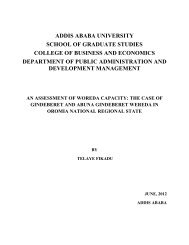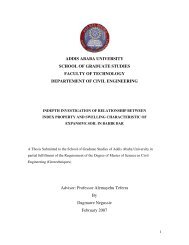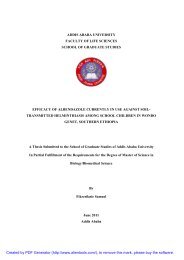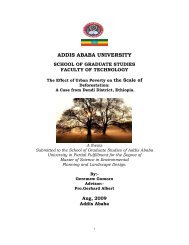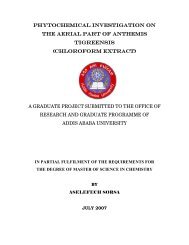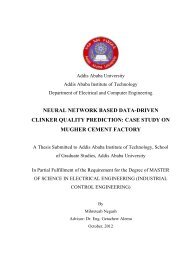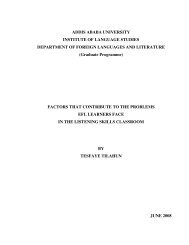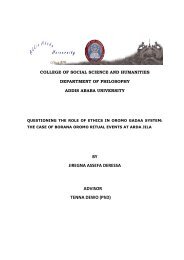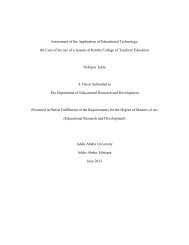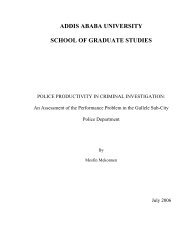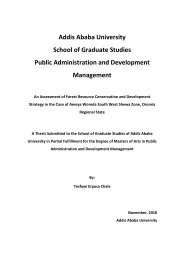HENOK MERHATSIDK 1.pdf - Addis Ababa University
HENOK MERHATSIDK 1.pdf - Addis Ababa University
HENOK MERHATSIDK 1.pdf - Addis Ababa University
You also want an ePaper? Increase the reach of your titles
YUMPU automatically turns print PDFs into web optimized ePapers that Google loves.
accelerating the Sudanese peace process. Following the revitalization of IGADD to IGAD in<br />
1996, the original ministerial sub-committee replaced by a permanent secretariat on the<br />
Sudan peace process. President Moi appointed Lieutenant General Lazarus Sumbeiywu as<br />
special envoy to Sudan, and then:<br />
The first rounds of talks held under this arrangement began in February,<br />
2000. In July 2002, talks in Machakos, Kenya, resulted in the Sudanese<br />
Government and the Sudanese People’s Liberation Army (SPLA) signing<br />
the Machakos protocol. The protocol provides for a six-month “preinterim<br />
period” during which hostilities should cease and a formal cease<br />
fire should be established as soon as possible. During a subsequent six<br />
year “interim period”, the cease fire should be maintained and Sharia<br />
law should not be applied in the south during that period. After six years<br />
a referendum on the southern self –determination should be held<br />
(www.igad region.org).<br />
For those who follow attentively the Horn sub-regional political dynamics, the achievement<br />
of ending civil war in southern Sudan is a tremendous outcome for the IGAD member states<br />
in general and Ethiopia and Kenya who have facilitated the realization of the peace process<br />
in particular. Ethiopia shares thousands of kms borderlines with Sudan. It was also<br />
sponsoring SPLM/A during the Derg regime against the Sudanese government. Kenya was<br />
pro-west in the Cold War era and its relations with Sudan were not hostile. The only bone of<br />
contention between Kenya and Sudan is the Elmi Triangle which is believed to be oil rich<br />
area and claimed by the Sudan government. Another worst periods in the relations between<br />
Sudan and IGAD member countries in general and Sudan and Ethiopia in particular was the<br />
exporting of Islam to the neighboring countries by the National Islamic Front (NIF) that was<br />
influential in Sudan Politics ultimately leads to strong response by Ethiopia, Ugandan and<br />
Eritrea (Young, 2007: 10).<br />
According to the Ethiopian government, Sudan is a better market for Ethiopia and thus<br />
widening cooperation in many fields could benefit the people of the two countries. Helping<br />
opposition groups against one another’s security leads them to self destructive end. Hence,<br />
the Ethiopian policy towards Sudan remains mainly peaceful, when problem arises they will<br />
55




